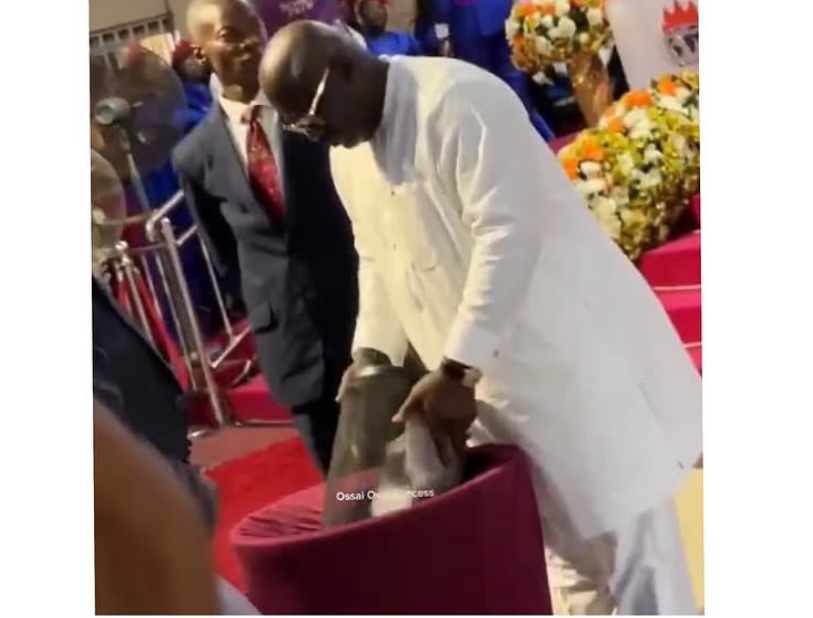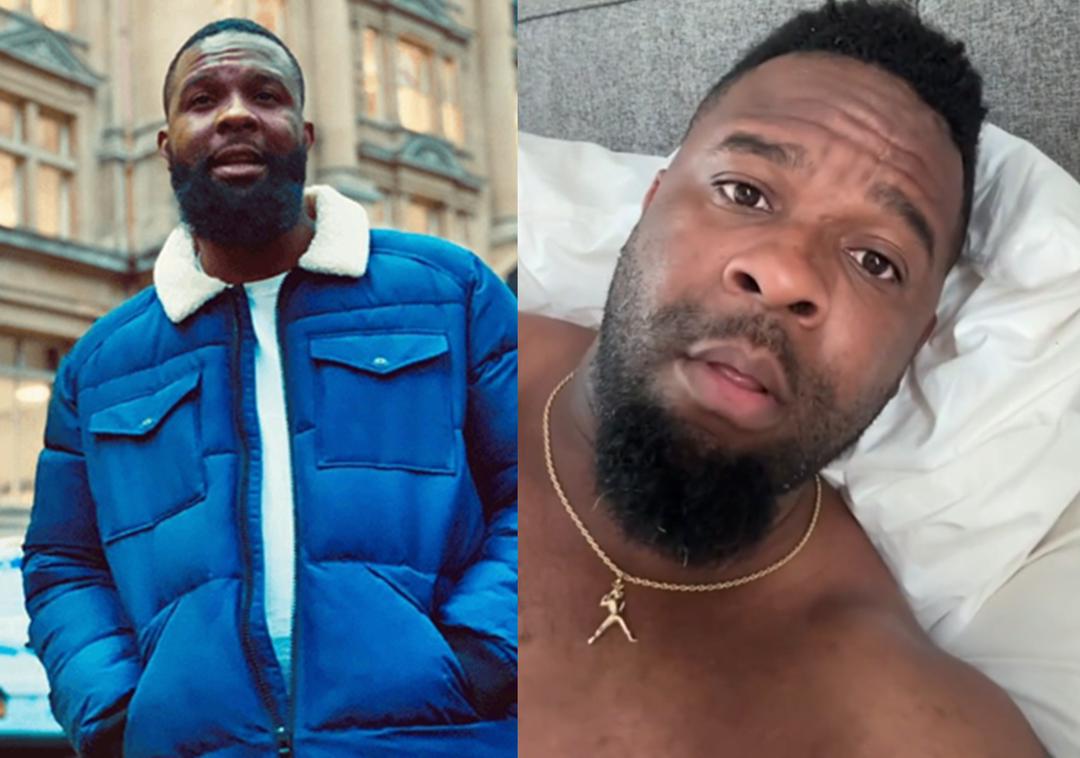
Governor Turned Usher: Delta State’s Sheriff Oborevwori Stuns Congregation as He Collects Offerings During Church Service

In a heartwarming and unexpected moment that has since set social media abuzz, Delta State Governor, Rt. Hon. Sheriff Oborevwori, was spotted performing a humble duty rarely associated with people in high political office—collecting offerings as an usher during a church service. The video, shared by media aide Ossai Ovie Success, has gone viral across platforms, drawing reactions from Nigerians who were both surprised and deeply moved by the governor’s simple act of service.
The footage shows the governor dressed in traditional attire, standing among other ushers as he moved through the aisles with an offering bag in hand, collecting contributions from worshippers. His demeanor was calm, respectful, and fully engaged in the activity, blending seamlessly into the congregation without any air of political superiority. For many in attendance, it was a moment that transcended politics—a rare reminder that leadership, at its core, is about service.
The church service, held in Delta State over the weekend, was described by attendees as spiritually charged and filled with gratitude. Eyewitnesses noted how the governor arrived quietly, participated fully in worship, and later volunteered to join the ushering team in collecting offerings. “It was a surprise to everyone,” one worshipper said. “No one expected the governor to stand up and collect offering like an ordinary member. It showed humility.”
Ossai Ovie Success, a close aide to the governor who shared the clip, captioned it with pride, writing that the governor’s action demonstrated his down-to-earth nature and his heart for God. “Governor Sheriff Oborevwori is not just leading Delta State politically, he’s leading spiritually,” Ossai wrote, adding that such gestures of humility are what make the governor stand out.
The video has since sparked a flood of reactions online. On Instagram, Facebook, and X (formerly Twitter), users have flooded comment sections with admiration and surprise. “This is the kind of leadership we need,” one commenter wrote. “When a leader can humble himself before God, he can truly serve the people.” Another user added, “Forget politics, this man just showed character. Power doesn’t change a humble heart.”
However, as with many things on social media, not everyone viewed it through the same lens. Some users suggested that the act was a calculated political move intended to boost public perception ahead of future elections. A few skeptics argued that politicians often use public displays of piety to score points. “Let’s be honest, they know people are watching,” one critic commented. “If the cameras weren’t there, would he still do it?” Yet others quickly countered that such cynicism only reveals how much the public has grown distrustful of genuine acts by those in authority.
Beyond the debate, the image of a sitting governor holding an offering bag and moving among ordinary worshippers has become a symbolic moment in Nigerian political culture. In a society where leaders are often seen as distant, unapproachable figures surrounded by security details, Oborevwori’s action broke that wall of separation—at least for a day. It projected an image of accessibility, humility, and faith-based leadership that resonated deeply with people far beyond Delta State.
Political analysts who have followed Oborevwori’s leadership style note that this public gesture aligns with his reputation as a people-focused leader. Since assuming office, he has often emphasized inclusivity, grassroots development, and the importance of maintaining a strong connection with the everyday citizens of Delta. His decision to worship publicly and serve within the church community, they argue, reinforces that image.
Social media reactions also highlighted how rare it is to see Nigerian leaders participate in such everyday community roles. In many cases, politicians are seen sitting in VIP sections during church services, shielded by aides and protocol officers. But the Delta governor’s willingness to participate in a humble role stood out. “He didn’t come to be worshipped, he came to worship,” one user wrote. “That’s the difference between leadership and rulership.”
Videos from the service show smiling church members handing their envelopes and cash offerings to the governor as he moved through the rows, bowing slightly in gratitude each time. His calm demeanor and steady pace reflected comfort in the role, as though it were something he had done before. Many were struck by how naturally he carried himself in that setting—without hesitation or pretense.
Religious leaders have also weighed in, commending the governor for leading by example. A senior pastor in Asaba praised the moment, saying it sends a strong message about servant leadership. “When leaders serve in God’s house, they learn to serve people better,” the pastor said. “It’s a reminder that political authority is temporary, but spiritual humility is eternal.”
In a nation often weighed down by the arrogance of power, this small act of humility has become a refreshing headline. Nigerians, tired of leaders who separate themselves from the people, found comfort in seeing one of their own leaders step into the role of a servant—even if only for a brief moment. “We need more of this kind of energy,” one comment on X read. “If our leaders could serve in church like this, maybe they’d remember how to serve us in government.”
Interestingly, the governor himself has not released a personal statement on the incident. Sources close to Government House, Asaba, say he sees no need for one. “He didn’t do it for show,” an aide reportedly said. “It was simply an act of worship. The governor has always believed that no one is too big to serve God.”
The viral clip, now widely shared by blogs and online news outlets, has also sparked conversations about faith, leadership, and authenticity in public life. In a time when citizens often question the sincerity of political figures, moments like these—whether planned or spontaneous—carry emotional weight. They remind people that leaders, too, are human beings capable of humility and devotion.
As Sunday turned to Monday, hashtags like #GovernorUsher, #SheriffOborevwori, and #DeltaGovernor trended on Nigerian social media, with thousands of Nigerians applauding the gesture. Some drew parallels between the governor’s act and the biblical story of King David dancing before the Lord—an image of power bowing before the divine. Others simply said they hoped more leaders would follow his example in both worship and governance.
Whether interpreted as an act of faith, humility, or public relations, one thing is undeniable: the image of Sheriff Oborevwori, governor of Delta State, holding an offering bag inside a crowded church, is one that has touched hearts across Nigeria. In a political landscape often dominated by power displays and protocol, that single act of service has stood out—quietly yet powerfully—as a symbol of the kind of leadership many Nigerians yearn for.
As the video continues to circulate, many are left with the same thought: maybe leadership isn’t always about the podium or the power; sometimes, it’s about standing in the aisles, collecting offerings, and showing the people that no one—no matter how high in office—is above service.high in office—is above service.


